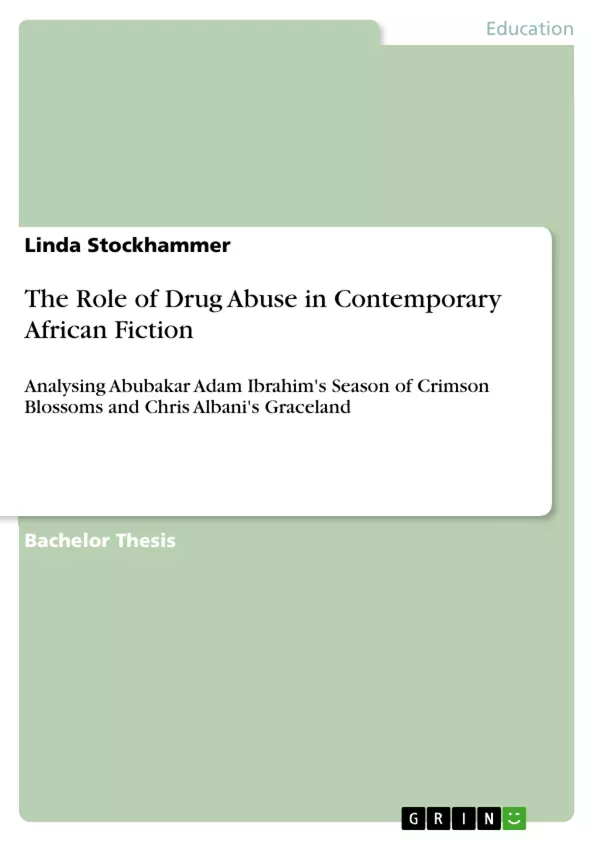Not long ago, the topic of drug abuse was considered a taboo subject in African literature. Now issues like drug abuse are starting to be openly addressed. This opens up a completely new possibility for African authors to bring in cultural aspects in their narrations. Within the scope of this bachelor thesis, the role of drug consumption within the African context will be analysed by looking at the role drug abuse plays in contemporary African fiction and in how far this representation in literature reflects the actual cultural situation in Africa. Abubakar Adam Ibrahim's "Season of Crimson Blossoms" and Chris Albani's "Graceland" will hereby serve as the basis for the literary analysis. By means of a literature sociological approach, the African social milieu and conformities of cultural and narrative structure will be elaborated.
Both books are contemporary African respectively Nigerian works that deal with drug abuse. While Graceland was published in 2004, Season of Crimson Blossoms had its initial publication in 2015.
Inhaltsverzeichnis (Table of Contents)
- Introduction
- African Culture
- Africa and Drugs
- Drug Abuse in African Literature.
- Abubakar Adam Ibrahim's Season of Crimson Blossoms
- Chris Abani's Graceland
- Women and Drugs.
- Conclusion.
Zielsetzung und Themenschwerpunkte (Objectives and Key Themes)
This thesis explores the role of drug abuse in contemporary African fiction, examining how it reflects the social and cultural realities of the continent. The analysis focuses on two novels, Abubakar Adam Ibrahim's "Season of Crimson Blossoms" and Chris Abani's "Graceland," using a literature sociological approach to analyze their narrative structures and cultural contexts.
- The cultural and social context of drug abuse in Africa.
- The representation of drug abuse in contemporary African literature.
- The relationship between literature and society in Africa.
- The impact of historical events and globalization on African culture.
- The role of gender and inequality in the African social context.
Zusammenfassung der Kapitel (Chapter Summaries)
- Introduction: This chapter introduces the topic of drug abuse in African literature, highlighting its increasing prominence in contemporary works. It emphasizes the need to understand the social and cultural context of drug abuse in Africa and its connection to the economic situation of the continent.
- African Culture: This chapter delves into the definition and complexity of African culture, examining its various aspects, including language, traditions, social norms, and values. The chapter explores the diversity of African culture, acknowledging both its positive and negative dimensions, and highlighting its dynamic nature. It also discusses the influence of cultural transmission and the impact of globalization on African societies.
- Africa and Drugs: This chapter focuses on the prevalence of drug abuse in Africa, examining the socioeconomic and cultural factors that contribute to its prevalence. The chapter also explores the history of drug abuse in the continent, including its historical roots and the influence of international drug trafficking networks.
- Drug Abuse in African Literature: This chapter explores the representation of drug abuse in contemporary African fiction, focusing on two specific novels: Abubakar Adam Ibrahim's "Season of Crimson Blossoms" and Chris Abani's "Graceland." The chapter analyzes the portrayal of drug abuse, its impact on characters and narratives, and its connection to broader social issues within the novels.
Schlüsselwörter (Keywords)
This thesis explores key themes such as drug abuse, African culture, contemporary African fiction, literature sociology, social context, globalization, gender roles, inequality, and the relationship between literature and society. The novels "Season of Crimson Blossoms" by Abubakar Adam Ibrahim and "Graceland" by Chris Abani serve as case studies for analyzing these themes and their interconnectedness within the African context.
- Quote paper
- Linda Stockhammer (Author), 2018, The Role of Drug Abuse in Contemporary African Fiction, Munich, GRIN Verlag, https://www.grin.com/document/512721



